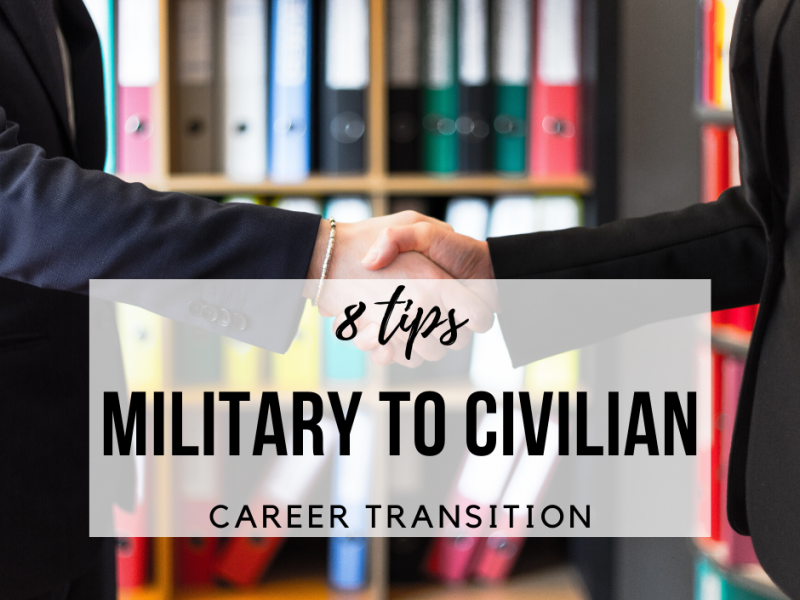Updated: December 2020
As you near your military separation, you will probably have many questions. The military to civilian transition can be a big change for most. The good news is that it has never been a better time to be a veteran. Companies are actively searching for vets because the vast majority turn out to be GREAT employees. All you have to do is get the job! In this post we’ll share 8 tips to help you successfully navigate your way to a new career.
1. Jump into action
One of the great things about the military is you know exactly when you will be “unemployed.” Don’t wait until 30 days before your separation before starting the military to civilian transition process. ASSESS your options and create an ACTION plan. Use the 12-month countdown. Months 12 through 5 are the preparation phase (decide what you want to do, prepare yourself, and build your “marketing” package). Months 4-2 are interview months. Search for the jobs you really want. Send resumes and wow hiring managers with your abilities. Month 1 is the final phase. It’s time to negotiate and accept an offer and get ready to start work.
2. Work smart
Now that you are in the 12-month window, explore all of your options, from location and industry to company and position. There are lots of opportunities for veterans and resources to help you help you. However, you have to decide which job is right for you. You might want to focus on organizations with a history of hiring veterans. This way you don’t have to convince them of your worth. Attend multiple military job fairs to evaluate companies that are already open to helping you transition. Search for recruiters with a military background because they will know how to effectively position you and your skills in the corporate world. And don’t forget to take advantage of all the free services available to military vets. There are tons of military placement firms, military job boards, military job fairs, TAP/ACAP, etc. Plus there are also military-specific places to network such as the VFW and military associations like AUSA, MOAA, Marine for Life, etc.
3. Civilianize yourself
Many people get confused when evaluating veterans because the military has its own language and structure. Your job title will likely not equate with anything in the corporate world. You have to civilianize your resume, experience, and verbiage. Get used to framing your experience in a way that civilians will not only understand but also connect with the job you want. The good news is, you have a ton of applicable skills and traits from your military experience, to make you a desirable candidate.
4. Tailor your resume, Linkedin profile, and cover letter
A lot has changed in the career world, especially if you haven’t applied for a job for a few years. However the one thing that remains the same is the need for tailored application materials. The resume is probably the hardest part of this process. It takes practice and experience to be able to read a military job description, recognize the transferable skills, and explain your work history. You must be able to do this in a way that is truthful while also meeting stated job requirements. For the most part, resumes don’t get you the job, but they can very quickly eliminate you. This is especially true when the stack of applications reaches the hundreds. To maximize your chances of landing an interview, you must tailor your resume to the target role, company, and industry.
Your other application materials are also key pieces to your total professional brand package. The cover letter still matters just as much as the resume. And last but not least, is your Linkedin profile. An optimized Linkedin profile can make or break your job search so it’s worth spending time to get it right.
5. Build credibility by learning job skills
Remember, ideally you have 12 months, which gives you time to build credibility and learn job skills if you want to transition into a completely new area. Research the field/industry you want to got into to identify the associations, certifications, and even college or professional development courses that seem popular. So you may have been in logistics in the Army but getting your Chartered Financial Analyst Certification, taking some finance courses, and attending the major industry conferences lend credibility to your argument that you will be able to fill a role in finance. Another good idea for getting experience is volunteering for projects related to your intended area of transition before you are released from the military.
6. Form a network that works for you
Whether you know it or not – by being on LinkedIn, joining local organizations or volunteering with a nonprofit – you are building a network. The idea is to build relationships with new people because each of them has the potential to help with your job search. Maybe they work at a company you are interested in or maybe they know someone who does or maybe they can give you good advice. The great thing about a network is that you never know where it can lead you!
7. Start connecting with recruiters
An effective networking strategy wouldn’t be complete without the help of recruiters – LOTS of recruiters! You’ll want to start making connections before your separation since recruiter engagement can take time. Working effectively with recruiters is a critical part of job search strategy. Recruiters have the power to disclose unadvertised job postings as well as open doors into companies for the right candidate. You’ll need them your entire career so there’s no time like the present to start connecting.
8. Mind your move
Don’t automatically assume and plan to use your military move to go back to your hometown. A huge advantage for military job seekers is that you can apply for just about any job that meets your criteria, no matter where it is located because your military move can pay for relocation to the city of your new job. Most civilian companies only pay relocation for jobs at the highest level, so if you don’t follow the 12-month plan and have your job lined up before your separation, you may be severely limiting your opportunities. Keep an open mind about cities and regions your family might like, and be sure to tell potential employers when you send your resume that you can cover your own relocation expenses.
If you’re hoping to improve your job search strategy and land a job in record time, check out the Job Search Accelerator. In this budget-friendly job landing community you’ll have access to all of Noelle’s expert resources including optimized resume and cover letter templates, networking scripts and templates, LinkedIn optimization courses, interview answer scripts and more – everything you need to feel confident, navigate the job search successfully, and put your best foot forward as an applicant.


 Why Your LinkedIn Summary is Critical for Landing a Job
Why Your LinkedIn Summary is Critical for Landing a Job


